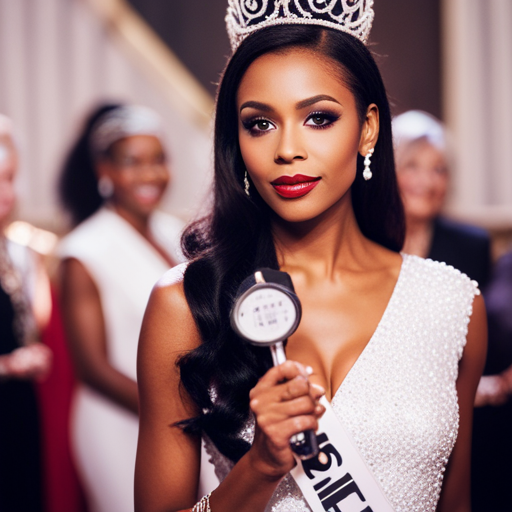Understanding Pageant Contracts and Agreements

Navigating through the world of pageant contracts can feel like traversing a complex maze. Understanding the intricacies of these agreements is crucial for aspiring pageant contestants and organizers alike.
This article aims to shed light on the importance of pageant contracts, dissecting key components, rights, and obligations, and demystifying legal terminology.
By the end, readers will be equipped with the knowledge to confidently navigate the negotiation process with clarity and understanding.
Importance of Pageant Contracts
The importance of pageant contracts lies in establishing clear expectations and responsibilities for all parties involved in the pageant process. These contracts outline the contractual obligations of the organizers and the contestant rights, ensuring that both parties understand their roles and responsibilities. By clearly defining these terms, pageant contracts help to prevent misunderstandings and disputes that may arise during the course of the event.
Moreover, pageant contracts have legal implications that protect both the organizers and the contestants. They serve as a formal agreement that can be referred to in the event of any contractual disputes. This helps to mitigate potential legal issues by providing a clear framework for resolving conflicts.
For contestants, these contracts safeguard their rights and ensure that they are treated fairly throughout the competition. It also provides them with a clear understanding of what is expected of them, including participation requirements, conduct guidelines, and any potential consequences for breaching the contract.
Key Components of Contracts
An essential aspect of pageant contracts is outlining the key components that establish the terms and conditions governing the relationship between the organizers and the contestants. Contracts basics encompass fundamental elements such as the duration of the agreement, compensation details, obligations of both parties, termination clauses, and dispute resolution mechanisms. These components form the foundation of the contractual relationship and play a crucial role in ensuring that both parties are clear about their rights and responsibilities.
| Key Components | Description |
|---|---|
| Duration of Agreement | Specifies the start and end dates of the contract, including any provisions for renewal or extension. |
| Compensation Details | Clearly outlines the financial remuneration, prizes, or benefits the contestant will receive. |
| Obligations | Defines the specific duties and responsibilities of both the organizers and the contestants. |
| Termination Clauses | Outlines the conditions under which either party can terminate the contract before its completion. |
| Dispute Resolution | Establishes the procedures for resolving any conflicts or disagreements that may arise. |
When negotiating such contracts, it’s crucial for contestants to carefully consider these components and employ effective contract negotiation strategies to ensure that their interests are protected and that they enter into a fair and mutually beneficial agreement.
Rights and Obligations
Pageant contracts clearly outline the rights and obligations of both organizers and contestants, establishing the parameters of their respective roles and responsibilities. Understanding these legal responsibilities and contractual rights is crucial for all parties involved.
-
Legal Responsibilities:
Pageant contracts specify the legal responsibilities of organizers and contestants. This includes adhering to all competition rules and regulations, maintaining professionalism and ethical conduct, and upholding the reputation of the pageant and its sponsors. -
Contractual Rights:
Both organizers and contestants have specific contractual rights outlined in the pageant agreement. These rights may include access to certain promotional opportunities, the use of images and footage from the pageant for personal promotion, and the assurance of fair treatment and support throughout the competition. -
Mutual Obligations:
The contract also establishes mutual obligations between the organizers and contestants. This could involve commitments to attend scheduled events, fulfill media and sponsorship obligations, and support charitable or community initiatives associated with the pageant. Understanding and fulfilling these obligations is essential for a successful and harmonious pageant experience.
Understanding Legal Terminology
A thorough comprehension of the legal terminology within pageant contracts is essential for both organizers and contestants to ensure clear communication and adherence to the agreed-upon terms.
Legal terminology in contracts refers to the specific language and terms used to outline the rights, responsibilities, and obligations of the parties involved.
It is crucial for individuals involved in pageants to have a clear understanding of legal terminology to accurately interpret the contract’s provisions and implications.
Contract interpretation, a fundamental aspect of legal terminology, involves analyzing the language used in the contract to understand the parties’ intentions and the scope of their obligations.
It is important to pay attention to details such as definitions, conditions, representations, and warranties, as they have specific legal meanings and implications.
Failure to understand the legal terminology within pageant contracts can lead to misunderstandings, disputes, and potential legal consequences.
Therefore, both organizers and contestants should seek legal advice or clarification when encountering unfamiliar legal terms in pageant contracts to ensure full comprehension and compliance.
Navigating Contract Negotiations
Understanding legal terminology is crucial for navigating contract negotiations in pageants, as it provides the foundation for clear communication and effective interpretation of the terms and obligations outlined in the agreements.
When navigating contract negotiations in the context of pageants, it’s essential to consider the following:
-
Understanding Contract Terms: Prior to entering negotiations, it’s imperative to thoroughly understand the terms outlined in the contract. This includes the duration of the agreement, specific obligations of the parties involved, financial arrangements, and any additional requirements such as appearances or endorsements.
-
Effective Negotiation Strategies: Developing effective negotiation strategies is vital for ensuring that the terms of the contract align with the interests of the pageant participant. This involves conducting thorough research, setting clear objectives, and being prepared to articulate and defend specific requests or modifications to the contract terms.
-
Seeking Professional Guidance: Engaging the services of a legal professional with expertise in pageant contracts can provide valuable support during negotiations. A knowledgeable attorney can offer guidance on legal implications, potential risks, and opportunities for favorable adjustments to the contract terms.
Frequently Asked Questions
Can a Contestant Negotiate Changes to the Standard Pageant Contract Terms?
Contestants can negotiate changes to standard pageant contract terms, utilizing various negotiation tactics. However, this may have legal implications, requiring careful consideration. Legal counsel should be sought to navigate potential contractual adjustments.
What Happens if a Contestant Breaches the Terms of the Pageant Contract?
Consequences of breaching a pageant contract include legal recourse and potential restrictions on title usage. Contestants should be aware of their rights and the implications of contract breaches before signing.
Are There Any Restrictions on a Contestant’s Rights to Use Their Pageant Title and Likeness After the Competition?
Yes, there are restrictions on a contestant’s rights to use their pageant title and likeness after the competition. These limitations are outlined in the pageant contract and typically govern post-pageant opportunities, title usage, and likeness rights.
How Are Disputes or Disagreements Between the Pageant Organization and the Contestant Typically Resolved?
Disputes between pageant organizations and contestants are typically resolved through mediation or arbitration, as outlined in the pageant contract. Contestant rights, title usage restrictions, and financial penalties are subject to the terms of the agreement.
What Are the Potential Financial Obligations and Responsibilities for a Contestant During and After the Pageant?
Contestants may have financial obligations such as entry fees, wardrobe, and travel expenses. They are responsible for adhering to title usage restrictions and negotiating contract terms. Post-pageant, they may have duties to fulfill.
Conclusion
In conclusion, understanding pageant contracts is crucial for contestants to protect their rights and obligations.
Key components and legal terminology play a significant role in navigating contract negotiations. It is essential to carefully review and comprehend the terms before signing any agreement.
By doing so, contestants can ensure they are not signing their life away, figuratively speaking.




